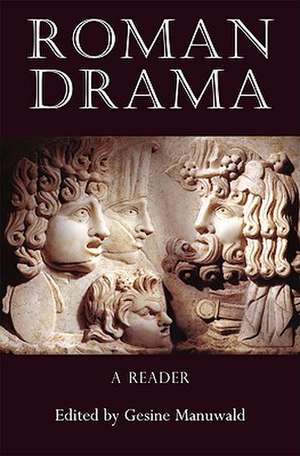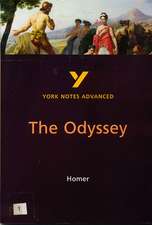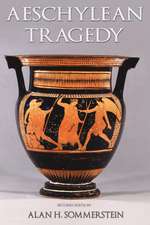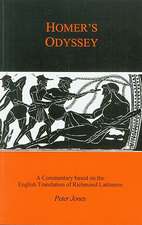Roman Drama: A Reader
Editat de Dr. Gesine Manuwalden Limba Engleză Paperback – 16 iun 2010
Preț: 178.56 lei
Nou
Puncte Express: 268
Preț estimativ în valută:
34.17€ • 35.54$ • 28.21£
34.17€ • 35.54$ • 28.21£
Carte tipărită la comandă
Livrare economică 14-28 aprilie
Preluare comenzi: 021 569.72.76
Specificații
ISBN-13: 9780715638699
ISBN-10: 0715638696
Pagini: 224
Dimensiuni: 156 x 234 x 18 mm
Greutate: 0.34 kg
Editura: Bloomsbury Publishing
Colecția Bristol Classical Press
Locul publicării:London, United Kingdom
ISBN-10: 0715638696
Pagini: 224
Dimensiuni: 156 x 234 x 18 mm
Greutate: 0.34 kg
Editura: Bloomsbury Publishing
Colecția Bristol Classical Press
Locul publicării:London, United Kingdom
Caracteristici
Examines Roman drama as a genre of Latin literature that was influential both in the culturallife of the ancient Romans and in the European theatre tradition
Notă biografică
Gesine Manuwald is Senior Lecturer in Latin Language and Literature, Department of Greek and Latin, University College London, UK. Her publications include, as editor, Cicero, Philippics 3-9 ( 2007); a revised edition of Cicero, Philippics (2009) and Roman Drama: A Reader (2010).
Cuprins
Preface Notes for the Reader Introduction: Overview of Roman DramaI 1 Background and evolution I 2 Dramatic genres I 3 Dramatic poets I 4 Occasions and venues I 5 Actors and productions I 6 Audiences 17 Poetry and performance I 8 Form and style I 9 Characteristics and developments I 10 Reception and transmissionIllustrations Appendix 1 Roman dramatic poets and their plays Appendix 2 Chronological table Testimonia on Roman DramaT 1 On the introduction of drama to Rome (Liv. 7.2; Val. Max. 2.4.4)T 2 On the introduction of Greek literature to Rome (Hor. Epist. 2.1.145-67)T 3 On the dates of the early dramatists (Cic. Brut. 71-6; Gell. NA 17.21.42-9)T 4 On the assessment of comic poets (Volcacius Sedigitus, fr. 1 FPL3, ap. Gell. NA 15.24)T 5 On the assessment of early Roman dramatists (Hor. Epist. 2.1.50-62)T 6 On the assessment of Roman dramatists (Quint. Inst. 10.1.97-100)T 7 On theatre buildings (Vitr. 5.6; Tert. Spect. 10.1-9)T 8 On the development of theatre buildings (Val. Max. 2.4.1-3, 6)T 9 On revival performances of 'old' plays (Plaut. Cas. 5-20) (some fragments) D 2 Ennius, Medea exul (all fragments) D 3 Pacuvius, Medus (all fragments) D 4 Pacuvius, on Fortuna (one long fragment) D 5 Accius, Medea sive Argonautae (some fragments) D 6 Accius, Brutus (some fragments) D 7 Plautus, Amphitruo 1-152 (prologue) D 8 Plautus, Miles gloriosus 1-78 (I 1) D 9 Caecilius Statius, Plocium (Gellius, NA 2.23) D 10 Terence, Eunuchus 232-64 (II 2); 771-816 (IV 7) D 11 Terence, Adelphoe 26-81 (I 1); 81-154 (I 2) D 12 Afranius, Divortium (all fragments) D 13 Decimus Laberius and Publilius Syrus (Macrob. Sat. 2.7.1-10) D 14 Seneca, Medea 150-78; 893-977 D 15 Pseudo-Seneca, Octavia 377-592 Nachleben of Roman DramaN 1 Nicholas Udall (1552), Roister Doister (Prologue; IV 7-8) N 2 William Shakespeare (early 1590s), The Comedy of Errors (III 1) N 3 Matthew Gwinne (1603), Nero (II 3) N 4 John Dryden (1690), Amphitryon; or The Two Sosias (I 1) N 5 Tony Harrison (1985), Medea: a sex-war opera (openings of acts 1 and 2)Bibliography and Further Reading
Recenzii
Manuwald's Reader usefully gathers into one place some of the key testimonia bearing on Roman drama.
Descriere
Roman drama is a genre of Latin literature that was influential both in the cultural life of the ancient Romans and in the European theatre tradition. This anthology provides an overview of the literary genre, including its various subtypes (tragedy, praetexta, comedy, togata, mime) and its historical development.
















